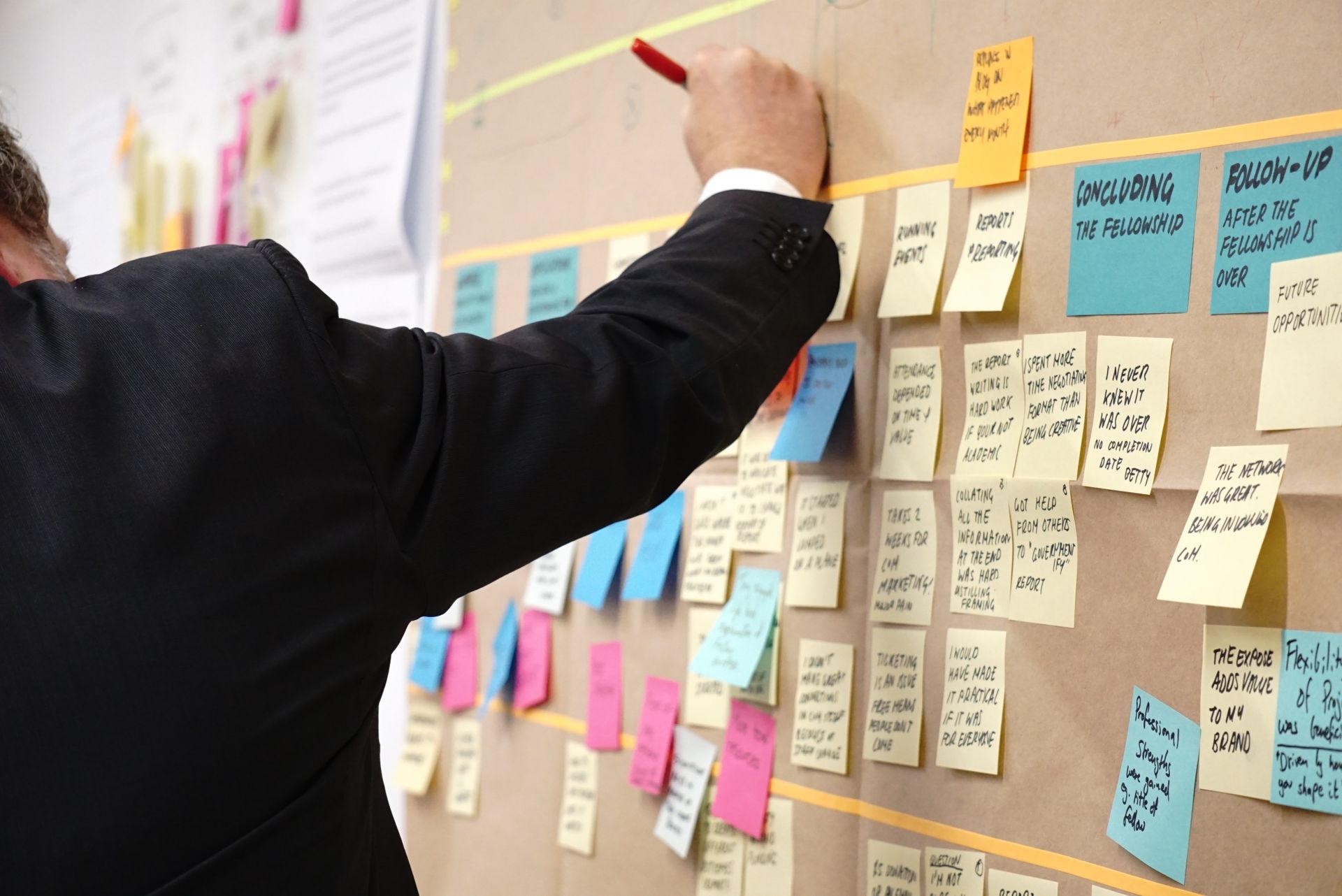Are all Change Professionals the same?
Paul Wiltshire • 19 May 2022
Our recent LinkedIn article considered whether most Change Professionals had similar strengths. A more detailed presentation of the research can be found here.
Information on the Gallup Stengthsfinder toolset (now called Clifton Strengths).
* Photo Reiseuhu - Unsplash

Finding the Time When surveyed , Project Sponsors identify “Finding the time” as the biggest challenge they face when performing the role. Perhaps that’s not surprising. Sponsors are often responsible for multiple projects, from our research sponsoring two to five is most common. Keeping on top of that number of projects is bound to be a challenge, particularly as the day job is unlikely to have gone away. So what can be done? Well , one option is to delegate project responsibilities. From our research, over three-quarters of companies do this. The trick is to make sure that delegation is accompanied by a delegation of authority – but that doesn’t always happen. Something that happens less often is delegation of line responsibilities, freeing up more time for projects by handing over responsibility for the day to day. Another way of freeing up time is to use it better. Has thought been given to how the sponsors time can be best used ? Are meetings focussed on decision making rather than discussing progress? Do meetings happen because they are scheduled rather than because they are required? Finally, something that might spark debate, has your organisation thought about “less is more” and reducing the number of projects on the go at any one time? In our experience, most organisations overestimate their capacity to manage change. Not the process of change but its volume. Perhaps it’s time to ask not “What do we want to do this year?” and more “What are we able to do this year?”

How important is it to have a project management qualification? Well according to the people who took part in one of our surveys the answer is “not very” as can be seen from the slide above. However, dig a bit deeper and it's less clear cut. From our discussions with those who took part, a qualification is most useful for those looking for a first break. Stories were common of agencies that used a Prince qualification to winnow down the pile of applicants, rather than looking for good practical delivery experience. However, more experienced project managers with a successful track record were usually able to leap this hurdle. Not having a qualification is acceptable if you can demonstrate that you can do perfectly well without one. So in summary – if you have youth and ambition – get a qualification. If you have age and experience – no need to retrofit. What do you think?

Access The first thing that the project manager should get from the project manager is access. The PM will run the project on a day - to - day basis but there are times when being able to talk to the project sponsor face to face will be invaluable. If the Project Sponsor is only available for Steering Committee meetings then the project is disadvantaged - and the chances of success reduced. Decisions Most decisions on the project will be taken by the project manager . But when there are change requests that could impact costs, timescales or qualities the project manager isn't the one to be making the call. Help with Senior Stakeholders This is an important part of the Project Sponsors' role. The PM can and will manage most relationships - but when some senior management heft is required the Project Sponsor needs to be willing to wade in. Feedback All Project Managers want to do a good job. Most recognise there are things they could do better and who better to provide feedback than the Project Sponsor, someone with the interpersonal skills to operate at the most senior levels. If your Project Sponsor isn't providing feedback on your performance - then ask for it ... Distance A Sponsor needs to be engaged and involved, but if they are too close to the project then they are in danger of both losing objectivity and undermining the authority of the project manager. What else should the PM expect from the Project Sponsor? Let me have your suggestions. All useful contributions will be included when we next run our training course for Project Sponsors. Sponsor Training Course

It struck me that bobsleigh , that daredevil winter sport where a group of athletes hurl themselves down a slope has a lot of similarities with running a project (and not because it's downhill all the way…). At the start of a run, just like in a project, there is a vast amount of activity, as the team tries to generate both speed and traction. After a certain amount of jostling for position , everyone is on board and behind the guy who is steering the course. Whether the bobsleigh charts the optimum line, indeed if it actually makes it to the finish without major incident, is largely down to the guy at the front who is pulling the strings. It’s probably a good time to park the analogy, as the steering on a project is usually done by committee and not just by one individual. Which begs the question - how should the steering committee be set up and how should it operate to increase the chances of a successful project? Based on CityIQ’s experience of working on projects and advising on project process – here are a few suggestions. Get organised Steering Committees that have an agreed remit, papers available in advance and an agenda tend to work better than those that don’t. Obvious isn’t it? Remember why you are meeting A steering committee isn’t a regular forum for project updates (anyone who reads the project status report should be up to speed already) - it’s for keeping things moving and moving in the right direction. The steering committee should be making decisions, resolving issues, monitoring risks and checking that the project is still on track to meet its objectives. Keep it lean According to academic research the optimum group size for effective decision making is 4.6. Our experience is that group size should be slightly bigger (we also think it should be a whole number). A group that is from six to eight feels about right if you want to get things done. One client we worked with had a weekly steering committee meeting that involved 24 people which I believe to be close to a record. Happy to be proved wrong… Start late to start on time Meetings often begin only when the last person arrives. If the last person is late then the meeting starts late. This is not just a steering committee problem – but as steering committees tend to involve people coming from different parts of the business the problem is exacerbated. To get round this why not start the meeting at quarter past the hour. That way if a previous meeting overruns yours won’t be delayed. Contribute If you attend steering committees, it’s probably because you have “skin in the game” and will be impacted by the project. Don’t be afraid to contribute or to ask questions. Challenge is good. It helps to ensure that there is a shared understanding of what is being discussed. Outputs A note of the meeting needs to be produced and distributed, so that those who attended and those who didn’t (or weren’t invited) will know what was decided. Quoting Wikipedia: “The minutes should contain mainly a record of what was done at the meeting, not what was said by the members. For most organizations or groups, it is important for the minutes to be terse and only include a summary of the decisions” If the minutes start to look and read like War and Peace your project manager is probably focusing on the wrong things or maybe even in the wrong job. And if you are chairing the meeting it’s also worth checking that someone is on the hook for taking notes and writing minutes. No surprises Steering committees are not the place to deliver bad news. If something has gone wrong, make sure that committee members know about it in advance – that way the time can be spent assessing the impact, discussing the issue and agreeing a way forward. Risks and Issues aren’t everything You can spend a lot of time discussing risks and issues particularly if the logs are large and dynamic. To avoid risks and issues taking over the meeting, we recommend focussing on the top three risks and any that have become significantly more likely since the last meeting. As for issues – discuss the ones that need to be addressed by the steering committee and leave the rest to the project manager. Don’t meet just because you are scheduled to meet Steering Committee meetings are often scheduled months in advance, so the time can be blocked out. However just because you are scheduled to meet doesn’t mean that you have to. If it’s the middle of the vacation period, the project is in mid-flight, everything is green and no major decisions are required there is nothing wrong with cancelling the meeting. In conclusion - will doing all of the above guarantee a successful project ? Sadly no, but do all of the above and you are more likely to cross the finish line in one piece…

Donald Rumsfeld made it into the Oxford Dictionary with: "There are known knowns; things we know we know. There are known unknowns; that is to say we know there are things we do not know. But there are also unknown unknowns – the ones we don't know we don't know.” With this spectacular sentence Rumsfeld nailed three of the four possible combinations of the known and the unknowns. However, he got me thinking. When it comes to knowledge (particularly in a project context), are there such things as known unknowns and if so what we should we be doing about them? I believe there are and I would define them as follows: “An unknown known is something that is known to some members of the team and not to all, or something that is known to the team but its significance is not appreciated.” Let me give you some examples of unknown knowns. I’ll start with far away and long ago before moving to the sort of issues we encounter on a day to day basis. Example one. When a piece of foam insulation broke off the Space Shuttle Columbia's external fuel tanks and struck the wing NASA limited its investigation, even though some engineers on the team suspected that the damage was serious. We all know what happened next. Example two. The British knew about the Enigma encryption machine before the war, as the German designers filed plans at the UK’s patent office in 1926. However it wasn’t until 1939, when they met their Polish equivalents that the British discovered that it was wired alphabetically, with rotor A wired to the first contact, B to the second contact and so on. This was the same set up as in the diagram in the patent application. This was known to the British boffins but was so obvious they never even considered it as a possibility. Example three and a little closer to home. Years ago I worked on a project which involved helping a company change its hardware maintenance supplier. The change was made for strategic reasons and meant that my client would have one maintenance provider worldwide. It was a big project. Sixteen countries, 16,000 devices. The project took six months. Three days after we made the cut-over it was announced that the new provider was pulling out of hardware maintenance. This had been known at group – but no-one in the UK was told or thought to check. Finally – example four. Our client had scheduled a cut-over to take place over a weekend. Various team members told the project manager they didn’t want to work over the weekend. He disregarded their concerns and insisted they carry on. What they knew and he didn’t was that at weekends the air con was turned off and that the temperature in the project room got seriously toasty. It turned out (of course) to be the hottest day of the year… All these examples fit my definition of an unknown knowns. So if we accept they exist how do we guard against them? Notwithstanding my first example – it’s not rocket science. Dealing with unknown knowns is all about two things: Firstly it’s about effective communication. Having an open culture where discussion is encouraged and having mechanisms in place that allow for concerns to be raised and investigated will draw out a lot of known unknowns. Secondly it’s about questioning assumptions. We could push the live date back four weeks but have we checked that all key resources are still available? Getting into the habit of talking (really talking) to people and questioning (really questioning) one’s assumptions are things that a good project manager should always be doing. Which begs the question – where would the world be today if Donald Rumsfeld had focussed in on the unknown knows…

One thing you can be sure of if you opt to work in financial services - you’ll go to a lot of meetings. And when I say a lot - I mean a lot. We asked senior people from across the spectrum of financial services organisations, how many meetings they attended each week. Forty percent admitted spending at least half their working week in meetings. It got us talking about whether this was a good use of time. Many of those sitting round the table had their doubts. This got me thinking. Should we just accept that being at work means being in meetings? And if that’s the case is there anything we could be doing to make our time and the time of those we meet with, just that little bit more productive? Here then, are some ideas about how things could be done differently – with acknowledgements where due to a variety of famous people who have no doubt sat through thousands of meetings themselves. Let’s start with an objective. I propose: Fewer meetings, shorter meetings, better meetings and fewer attendees Fewer Meetings The first question to ask is “If we have a meeting is it to make a decision or just to share information?” Bill Gates said: "You have a meeting to make a decision, not to decide on the question." I think he has a point. If you want to share information, then write a report. It’s true you might need to spend more time writing it than you would sitting in a meeting. But look at it from an organisational standpoint. Is it more productive: A) For one person to spend three hours writing a report and ten others spending five minutes reading it; or B) For eleven people to spend an hour in a progress meeting for an hour? Another question to ask is “Are we having this meeting because we always have this meeting?” Just because its in the diary doesn’t mean it needs to take place, especially if there are no decisions to be made. In other words, “If there is nothing to discuss don’t get together to discuss it!” Shorter Meetings Why are meetings mostly scheduled to start on the hour and last for an hour? There are two problems with doing this. Someone is bound to be late – having just come from a meeting elsewhere in the building that finished on the hour. Also, if a meeting is scheduled to last for an hour – that’s usually how long it takes. Discussion expands to fit the time available. So why not schedule your meeting to start at five past the hour and finish at five to the hour. Having done that – manage the meeting so that it ends early. Its not often you get a complaint when a meeting finishes ahead of schedule! Better Meetings Not much to say here that hasn’t been said already. Obvious suggestions: Have an agenda Circulate papers beforehand and make sure they have been read before the meeting Cover the important stuff first Manage the meeting by the clock Take brief notes for your own reference Summarise any decisions made at the end Fewer Attendees Jeff Bezos of Amazon came up with the idea of the two-pizza rule for meetings – only invite the number of people who can comfortably share two pizzas. Think about it. If you have twelve people sitting round the table (I’m assuming two large pizzas should be enough for 12 people) then theoretically everyone gets to talk for five minutes. Any more than that and you find people are attending but not contributing. Another way to winnow your list of invitees is to focus on people who are broadcasting rather than receiving. A friend tells a story of how sixty-five people either attended or dialled in to a particularly interesting meeting she was chairing. However only three contributed to the discussion and the decision to proceed was made by her and the project sponsor alone. On a personal level Elon Musk suggests that if you are at a meeting and not adding value you should walk out. You might think that couldn’t happen in your organisation but the next time you are in a big drawn out meeting look around the room to see how many people are checking their phones. They have effectively left the meeting – albeit it only in a virtual sense. To summarise Despite what you may think I know that meetings aren’t going to go away. However, if there were fewer meetings, if they were focussed on decision making, if they were populated only by people who needed to be there, then perhaps there would be more time available to work rather than just talk about work. Just a thought!

We gave some of our City contacts a list of tasks associated with running a CityIQ event and asked them to estimate the amount of time and effort involved. Most of the 50+ people who took part overestimated the effort involved and underestimated the elapsed time. The results and associated analysis are available to view on our resources page. *Photo by Saufi Mazlan - Unsplash

We have updated the CityIQ Project Health Check which you can now download from our resources page. There is no need to register, it's just a straightforward download in PDF format but if you would like an editable version then please contact us. We hope you find it useful. Any suggestions for modifications or improvements would be most welcome. *Photo by Simon Hutsch - Unsplash


